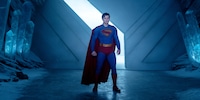
Review
Superman: the start of the new DC Universe is uninspiring
by Luca Fontana
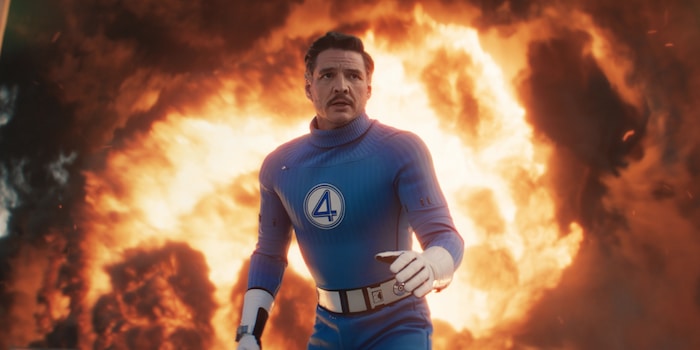
They were the heart of Marvel before there was a universe. A family of explorers, geeks and dreamers. Now the Fantastic Four are back – bringing wonder back to the Marvel Cinematic Universe.
Don’t panic, this review contains no spoilers. Everything mentioned here has already been revealed in trailers. Fantastic Four: First Steps will be in cinemas from 24 July.
There was a time when the Fantastic Four were Marvel. Full stop. When Stan Lee and Jack Kirby created them in 1961, it wasn’t just the start of a new superhero team. It was the Big Bang. The beginning of everything. Without the Four, there’d be no Spider-Man, no Iron Man, no anything. They were the face of Marvel. Its foundation. For an entire decade.
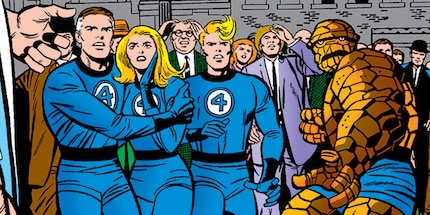
Unlike DC’s Superman or Batman, the Fantastic Four didn’t follow a rigid heroic code or an inflated ideal. They weren’t icons to be looked up to in awe – like the people in the new Superman movie. They were «just» a family. Dysfunctional, belligerent, but deeply lovable. They pulled together, failed together and picked themselves up again. That’s exactly what made them so special – they felt human. Relatable.
Tangible.
And now? They’ve finally arrived. They’ve taken their place in the MCU. In a retro-futuristic 1960s world that’s as playful and vibrant as their best comic book adventures – and at the same time as vast, as cosmic and as existential as the Marvel Universe itself. Fantastic Four: First Steps is the first big-screen adaptation that truly understands what this fantastic family is all about. And it’s easily the best Marvel film in years.
It takes less than five seconds to realise that Fantastic Four: First Steps doesn’t (yet) take place in our Marvel cinematic universe. At least not in the one that seems to have been crumbling since the Infinity Saga. This film transports us to Earth-828, an alternate reality where the 1960s aren’t the past; they’re the future. A world somewhere between Jules Vernes and Tomorrowland. Retro, yes – but also visionary. Boldly designed rather than old-fashioned.
And that’s where this fantastic family lives. For four years now, Reed, Sue, Johnny and Ben have been working as celebrated scientists, media darlings and superheroes. How did they get there? It’s outlined right at the beginning in a crisp, elegant montage. No repeating old mistakes. No slow build-up. Instead, there’s a clear focus: the Four are an established team. And the film wastes no time showing us why that’s so important.
Because what comes next is greater than anything they’ve ever experienced: a silver herald proclaiming the end of all existence. And a god in the Marvel universe, older than the universe itself – Galactus.
That sounds like a lot. And it is. But the Fantastic Four were never just superheroes in the comics, either. They were explorers, scientists, frontierspeople and inventors, driven by curiosity, not just duty. Their adventures put them against villains and took them through dimensions, time warps and galaxies – that’s what earned them the reputation of being the Star Trek of the Marvel Universe.
It’s a comparison that might surprise many who only know their story from the previous films, where they showed precious little of all this.
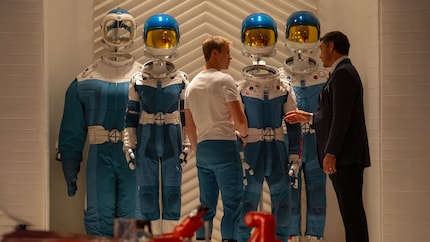
But First Steps is a return to those roots. More than that, it’s love letter to them. It’s no coincidence that the film’s set in the 1960s. It takes place in the very era in which Stan Lee and Jack Kirby first dreamt up the fantastic family. It seems like an homage – but it’s much more than that: it’s an act of creative liberation.
On Earth-828, this retro-futuristic era isn’t just flourishing; it’s practically exploding. It’s loud, colourful, playful and vibrant. A world full of Jetsons technology, candy-coloured aircraft, and scientific curiosity you’d love to touch. It’s a world that comes to life on the IMAX screen.
And just like in the comics, the family soon finds itself where it belongs: in space. They’re not just geniuses in lab coats; they’re astronauts. Pioneers of the unknown. Yes, previous films claimed that, too – even the botched 2015 version. Sort of. But space was just a plot device to explain their powers. This time, it’s a promise. And it’s fulfilled.
The Four soon find themselves travelling through alien worlds, discovering new forms of existence – and encountering Galactus, a comic book myth that transcends their and our wildest imaginations. He’s introduced with wonder, not a heavy-handed reveal. Through images that sometimes recall Interstellar and the Alien franchise: distorted time periods, alien physics, cosmic loneliness. Tracking shots that dare to pause for a moment, only to burst open again with explosive images.
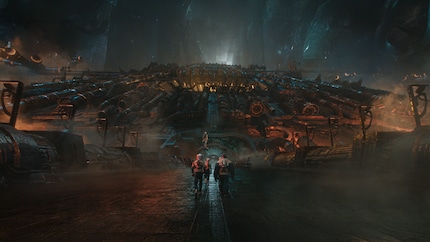
The fascinating thing is that First Steps makes no secret of its origins. When, for example, the hilarious Mole Man attacks Manhattan with his mole-bot in one scene, and the Silver Surfer proclaims the end of all life in the next, it’s not inconsistent – this is Lee and Kirby at their finest. This is Fantastic Four.
This is cosmic comic cinema in its purest form.
But as great as the spectacle is, Fantastic Four: First Steps is first and foremost a film about four people who don’t just fight together, they live together. They love each other, argue, tease each other, get on each other’s nerves – and yet they still trust each other without question. That’s exactly what the comics have always been about. And finally, a film captures that.
First things first: Pedro Pascal and Vanessa Kirby as Reed Richards and Sue Storm. What a power couple. The two carry this film with so much charm, power and mutual warmth that it almost seems ridiculously easy. From the very first moment, I believed they were married, that they were going through life – and the universe – together. That they argued because they understood each other. And understood each other because they knew each other.
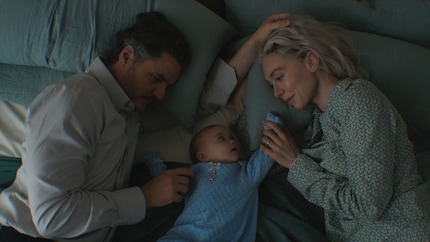
Kirby’s Sue isn’t just the heart of the team; she’s its moral backbone. While «Internet Daddy» Pascal never loses the nerd Reed Richards, he plays him with a dignity and wit that seem genuine even in the most jarring moments. Together, they’re both the parents of this superhero family and the emotional heart of the film. And maybe the strongest couple the MCU’s ever seen.
But what really makes this film stand out – especially compared to the new Superman – is its narrative economy. In just under two hours, First Steps manages to build an entire world, establish characters, depict conflicts and tell a cosmic adventure without ever seeming rushed. Everything meshes seamlessly. It all develops naturally. The film isn’t afraid of pacing, but there’s also no stress. This is storytelling with clarity and confidence in its own vision.
And in the audience.
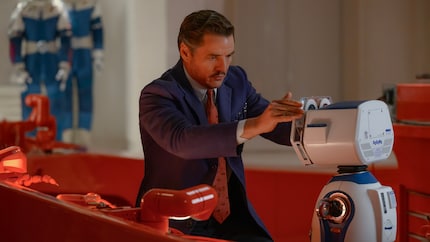
In contrast, Superman showed how not to do it two weeks ago. It seemed like a best-of mixtape of a universe we never got to know. There was a constant shift between action, meta gags, pathos, pseudo-politics and monster blobs. No sooner did one idea appear than the next one followed. It was as if James Gunn was afraid the audience would leave if things ever calmed down. So, it never did. And if it did, for once, Gunn immediately countered with another stupid line.
First Steps dares to do more. It dares to let emotions linger. To let its characters have their impact. And also to tone down the gag rate. There’s humour – charming, playful humour. But it comes from the characters rather than from the script. From looks. From moments. From chemistry. Marvel finally has actors and actresses you can trust to carry the space without having to script one gag after another.
And then there’s the music by Michael Giacchino. The man who’s already composed for Pixar, Star Wars, Planet of the Apes and Batman – and yet still manages to surprise again and again. And this time’s no different. Fantastic Four: First Steps is a triumphant comeback for the characters as well as a musical one. Because what Giacchino’s created here isn’t just a nice theme with a few variations; it’s a glue. A structure. An emotional map. It’s colourful, multifaceted, complex and…
…just euphoric.
No, really. The score carries this film – in its charming, bubbly, light-hearted moments as well as in its existential ones. It dances when Reed and Sue bicker. It blazes when Johnny races through the air. It roars when Galactus approaches. And it comforts when the family threatens to tear itself apart.
Nothing seems intrusive. No note’s trying to be more than it is. And yet everything resonates. It’s been a long time since a Marvel film score was designed like this. There’s no generic soundscape and no interchangeable action rumble. Instead, we get real, recognisable themes. It’s a signature.
Even now, as I write this review, it’s still echoing in my head: «Bap bap bap bap – Faaaantastic Fouuuuur!»
Fantastic Four: First Steps is more than just a successful fresh start. It’s a love letter to the roots of the Marvel Universe – and proof that this often-ridiculed family, of all things, has what it takes to reignite the MCU. Without multiverse gimmicks. Without constant laughs. Without cameos.
Instead, we get characters with heart. Images with power. Music with soul.
The very first shots exude that lovely 1960s optimism, somewhere between Jules Verne romanticism and Fallout retrofuturism. I love it. I also love that the film relies on atmosphere, a mature ensemble and genuine emotions. It thinks big, but remains approachable. It tells its story efficiently, but it doesn’t rush. And it’s unapologetically touching.
The result is a cosmic adventure that – at its best – captures exactly what the MCU once stood for: curiosity, wonder and humanity. Is it enough to get Marvel back on track? Who knows? But it’s the best first step for the fantastic family anyone could have wished for. And maybe – just maybe – it’s even the most important one.
I write about technology as if it were cinema, and about films as if they were real life. Between bits and blockbusters, I’m after stories that move people, not just generate clicks. And yes – sometimes I listen to film scores louder than I probably should.
Which films, shows, books, games or board games are genuinely great? Recommendations from our personal experience.
Show all